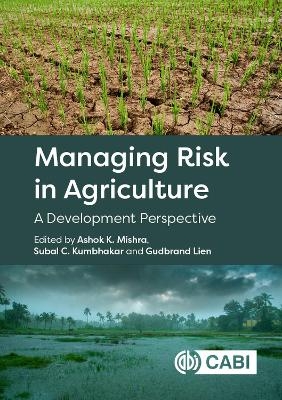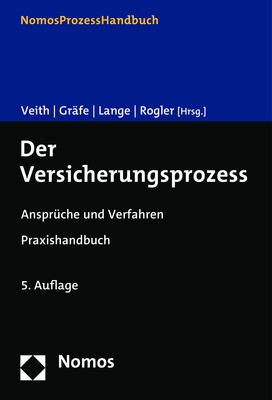
Managing Risk in Agriculture
CABI Publishing (Verlag)
978-1-80062-226-5 (ISBN)
Ashok K. Mishra (Edited By) Ashok K. Mishra is Kemper and Ethel Marley Foundation Chair in Food Management, Morrison School of Agribusiness, W. P. Carey School of Business, at the Arizona State University, USA, where he conducts research and teaching activities in public policy, finance, agribusiness, food security. He assumed a leadership role in the agricultural economics profession by serving as either an editor and/or associate editor for six journals in addition to service work for the American Agricultural Economics Association (AAEA). He has presented his work to non-academics such as USDA Secretary, OECD, National Public Policy Education Committee, the National Agricultural Research, Extension, Education, and Economics Advisory Board, and key policymakers from the Office of Management and Budget, Council of Economic Advisors. Mishra received a Ph.D. in Economics at North Carolina State University in 1996. Previously he has held positions at Louisiana State University, and the Economic Research Service of the USDA. His international work is in collaboration with IFPRI, IRRI, CIMMYT and ICRISAT. Ashok is Fellow of AAEA (2022); Fellow of WAEA (2020); Fellow of NAREA (2013). 2022 Fellow, National Academy of Agricultural Sciences (NAAS), India. Subal C. Kumbhakar (Edited By) Subal C. Kumbhakar received his Ph.D. in economics from the University of Southern California in 1986. He started teaching at the University of Texas in 1986 as an Assistant Professor and was promoted to Professor in 2000. He joined Binghamton University, SUNY in 2001. He was awarded University Distinguished Professor in Economics in December 2005. He teaches graduate econometrics (both theory and applied), and undergraduate microeconomics, statistics, and econometrics courses. He also taught at the Burdwan University, India as a Lecturer in Economics from 1977-1981.Subal's main area of research is applied microeconomics with a focus on estimation of efficiency in production. He uses production, cost, and profit function approaches to estimate economic efficiency. He has formulated a variety of panel data models to measure efficiency, which he has applied to a wide variety of topics covering agriculture, manufacturing, banking, airlines, electricity generation/distribution, public sector enterprises, etc. His recent works include environmental efficiency, modelling undesirable outputs. Some of his other research areas include: corruption and economic growth, foreign direct investment, adverse selection and moral hazards, risk and risk preference in agriculture and aquaculture. His current research includes semi and nonparametric panel data models with and without efficiency. Subal is a Fellow of Journal of Econometrics (1998). He holds an Honorary Doctorate degree (Doctor Honoris Causa) from Gothenburg University, Sweden (1997). Subal is currently a co-editor of Empirical Economics. He is serving as a Board of Editors and/or associate editors of Journal of Productivity Analysis since 1998, Technological Forecasting and Social Change: An International Journal since 1991, International Journal of Business and Economics since 2002, Journal of Agricultural and Applied Economics since 2014, Journal of Regulatory Economics since 2015, Macroeconomics and Finance in Emerging Market Economies since 2007, Applied Econometrics since 2016, Ecos de Economia: A Latin American Journal of Applied Economics since 2016. Gudbrand Lien (Edited By) Gudbrand Lien is a professor in business economics at Inland School of Business and Social Sciences, Inland Norway University of Applied Sciences in Lillehammer (in Norway) and senior researcher within agricultural economics at Norwegian Institute of Bioeconomy Research (NIBIO) at Ås (in Norway). Gudbrand has a dr. oecon (PhD) degree (within finance) from Norwegian School of Economics (NHH). His main field of research has been within risk analysis/decision analysis, agricultural economics, energy finance, energy economics, forest economics, dynamic pricing and quantitative innovation studies. He has published about 100 articles in high ranked refereed international journals. Gudbrand is also co-author (joint with J. Brian Hardaker, Jock. R. Anderson and Ruud B.M. Huirne) of the 2nd and 3rd edition of text book "Coping with risk in agriculture", both published at Cabi. Gudbrand has worked closely together with Professor J. Brian Hardaker for more than 20 years, and they have 24 scientific papers together. He has also worked together with Distinguished Professor Subal C. Kumbhakar in the past 15 years and they have written almost 20 scientific papers together. He is a Board Member of Energies since 2019 and European Review of Agricultural Economics from 2022.
SECTION I: UNDERSTANDING AND MODELING RISK, ATTITUDES, AND PREFERENCES 1: Principles of Good Practice in Dealing with Risk in Agriculture: A Review of Agricultural Decision Analysis. - J. Brian Hardaker and Gudbrand Lien. 2: Risk Preferences, Price Uncertainties, and Production Risk: A Survey. - Subal C. Kumbhakar. 3: Subjective Probabilities and Farmers’ Decision-Making in Developing Countries. - Simone Cerroni and Ruggiero Rippo. 4: Strategic Risk and Collective Action In Agriculture. - Ariel Singerman and Sergio H. Lence. 5: Assessing the Impact of Risk-Reducing Strategies on Food Security: Evidence from an Emerging Economy. - Aditya R. Khanal, Ashok K. Mishra and Gudbrand Lien. SECTION II: USING EXPERIMENTAL ECONOMICS TO MEASURE RISK, PREFERENCES, AND RISK MANAGEMENT STRATEGIES 6: Eliciting Farmers’ Risk and Uncertainty Preferences Using Contextualized Field Experiments in Developing Countries: A Pilot Study. - Simone Cerroni, Martina Bozzola, and Ruggiero Rippo. 7: Examining the Role of Risk Attitudes in Agricultural Management Decisions in Emerging and Developing Countries: Experimental Evidence. - Toritseju Begho and Kehinde Odeniyi. 8: How to Measure Risk Attitudes Among Poor Rural Households: An Overview of Popular Risk Elicitation Methods. - Selina Bruns. 9: Agricultural Risk Management and Technology. - Jean-Paul Chavas. 10: Farmer Risk Preferences and Willingness to Pay for African Rice Landrace Seed: An Experimental Choice Analysis. - Aminou Arouna, Nicholas Tyack, and Rachidi Aboudou. 11: Smallholders’ Willingness to Pay for Alternative Types of Crop Insurance in China. - H. Holly Wang and Lu Liu. 12: Role of Risk Aversion and Insurance Adoption in Extreme Climatic Shocks: Evidence from Indian Paddy Growers. - Asis Kumar Senapati. 13: Attitudes toward Risk and Farmers’ Willingness to Pay for Drought-Tolerant Maize and Weather Index Insurance in West Africa. - Tahirou Abdoulaye, Ali Essossinam, Abel-Gautier Kouakou and Tesfamicheal Wossen. SECTION III: CLIMATE CHANGE, RISK, AND RISK MANAGEMENT 14: Finance Utilization and Chili Contract Fulfillment. - Eliana Wulandari, Miranda P.M. Meuwissen, Maman H. Karmana and Alfons G.J.M. Oude Lansink. 15: Assessing the Climate Resilience of Semi-Arid Farming Systems in India: Framework and Application. - Arjuna Srinidhi, Saskia E. Werners, Fulco Ludwig, Marcella D’Souza, Miranda P.M. Meuwissen. 16: Risk Perceptions of Climate Change, Risk Preferences, and Cacao Farming. - Alexis H. Villacis, Ashok K. Mishra, Victor Barrera and Juan Dominguez. 17: Natural Shocks and Farm Household Behavior: The Consequences of An Earthquake in Pisco, Peru. - Marrit van den Berg and Ricardo Fort. 18: Adaptation to Climate Change and Risk Exposure: Insights from Smallholder Wheat Farmers in China. - Wanglin Ma, Hongyun Zheng and Puneet Vatsa. 19: Cropping System Diversification for Higher Productivity and Resilience of Agriculture: Evidence from India. - Jaweriah Hazrana and Pratap Birthal 20: Extreme Weather Events and Credit Demand. - Puneet Vatsa, Wanglin Ma, Hui Mao and Xiaheng Zhang. 21: How Beliefs about Climate Change Adapt: A Natural Experiment with Evidence on Excess Sensitivity to a Weather Event. - Seo Woo Lee, Hongli Feng and David A. Hennessy.
| Erscheinungsdatum | 03.10.2023 |
|---|---|
| Co-Autor | Tahirou Abdoulaye, Rachidi Aboudou |
| Verlagsort | Wallingford |
| Sprache | englisch |
| Maße | 172 x 244 mm |
| Gewicht | 996 g |
| Themenwelt | Sozialwissenschaften ► Soziologie ► Spezielle Soziologien |
| Technik | |
| Wirtschaft ► Betriebswirtschaft / Management ► Allgemeines / Lexika | |
| Betriebswirtschaft / Management ► Spezielle Betriebswirtschaftslehre ► Versicherungsbetriebslehre | |
| Weitere Fachgebiete ► Land- / Forstwirtschaft / Fischerei | |
| ISBN-10 | 1-80062-226-0 / 1800622260 |
| ISBN-13 | 978-1-80062-226-5 / 9781800622265 |
| Zustand | Neuware |
| Informationen gemäß Produktsicherheitsverordnung (GPSR) | |
| Haben Sie eine Frage zum Produkt? |
aus dem Bereich


